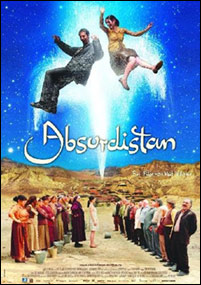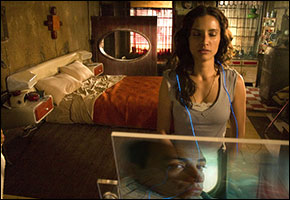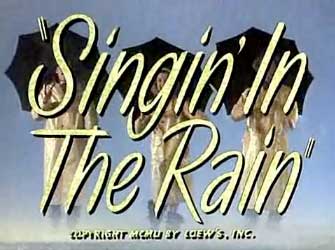TRAVERSE CITY, Mich. -- By strange turn of fate or my wife's careful selection, almost every film we saw this summer at the Traverse City Film Festival had an overt or subtle water theme. And they were surprisingly captivating.
Festival host and co-founder Michael Moore is ubiquitous in his emcee appearances - leaving most of his politics at the theater door to shepherd up-and-coming and all-star filmmakers through a week-long pageant in this Michigan region known to us locals as "Up North." While it's not uncommon for festivals to boast a wealth of documentaries and foreign films, we pride ourselves that "Borat" and Bill Mahr's "Religulous" premiered here in the Midwest. And Madonna made a cameo that captivated an adoring, star-stunned crowd during a screening of her documentary, "I Am Because We Are."
Maybe we have a heightened sense of water awareness because Traverse City is in the heart of the Great Lakes, where the clear, blue waves fuel a tourist economy. But whether Hollywood or indie, the traditionally dry issues of water and sanitation seeped into the stories on the screen. Scary, warm-hearted and even gut-burstingly funny.
"No water, no sex"
Take "Absurdistan," for example. Instead of the movie industry's often used war theme, a duel over drought becomes the context for a story about love, heroism and the endless battle between the sexes.
Absurdistan is a hardscrabble, obscure country lost somewhere in the Russian Caucasus. When the water supply piped from a mysterious mountaintop to a dusty village turns to a trickle and finally stops, the women rebel, withholding sex from their lackadaisical husbands until the water system is fixed. The story runs as a close cousin of Lysistrata, the Greek play where women suspend intimate relations until the men stop fighting.

"Absurdistan" is based on a true story, director Veit Helmer tells my Circle of Blue colleague Sarah Haughn. The story, he explains, addresses a profound crisis with a light-hearted twist.
"Water is a commodity which is rare in more and more countries, which creates problems," he said. "In the village where the original strike happened, in Turkey, the women had a very crazy idea to overcome the water problem. I was fascinated in treating such a serious topic with a very light comedy approach."
Helmer says that the film inspired his crew in unexpected, amorous ways.
"In the village (where the movie was made) we didn't have so much entertainment. So actually my crew did not respect the subject of a sex strike." There were more than seventeen relationships begun between the crew and actors.
"And so far," Helmer says, "two marriages happened with two children being born between those couples. Therefore, they are the first, the two real citizens of Absurdistan."
Kenny, "a glorified turd burglar"
A "mockumentary" film about an Australian porta-john worker might seem boorish and puerile. Gasp, another film that literally reeks of a waste of time. But "Kenny" puts a personal face on the taboo issues of hygiene, making them funny, fascinating and even so slightly profound.
It's hard to imagine someone whose father calls him "a glorified turd burglar" as somebody who has pride and compassion to the Number One and Number Two issues of sanitation. Yet Kenny is an irreverent, lovable story that not-so-subtly explores the dignity of human beings who face what most of flush from our conscience.
Filmmakers Clayton and Shane Jacobson prove that in every life there is a story filled with humor, irony and love. It brings home the sanitation issue in a way that all the numbers and images of the third world can't do.
Those working in the usually staid worlds of water and sanitation could all take a note from Kenny. This film hit theaters August 17, just in time to add a bit of down-home humor and perspective to the United Nations International Year of Sanitation.
Sleep Dealer
Set in a grim future remote-controlled by virtual workers and soldiers, "Sleep Dealer," from director Alex Rivera, is Blade Runner meets Minority Report. Just a few years from now, the world is dark and sci-fi -- characterized by infiltrating memory-sharing devices, immigration tensions and water privatization. Rivera creates a near-futurescape where would-be illegal immigrants in Mexico enter a dreamlike state, selling their sleep time to control construction robots in the United States.
Rivera pushes the science fiction genre, as he depicts an ever-thirsty society where corporations control water supplies, protecting them with deadly, remote-operated armies and aircraft. "In the cinema we get to reflect on the future of the society," Rivera recently told Circle of Blue. "And that's a very powerful act and an act full of potential."
In the film, Mexican subsistence farmers have to buy water for increasingly inflated prices. To make ends meet, the younger generation is driven to labor in the sleep-state factories, selling use of their neruosystms to power an interconnected world.
"It's not dreaming to go to a better place," Rivera said of his characters who strive for improved lives and independence. "That's the old story of immigration. Today's story of immigration is people who really have very few options and often those constricted options are produced by globalization, by U.S. economic intervention. And water privatization, water shortage, is the tip of the spear, the most urgent version of that story."

As we spoke with Rivera from his home in Brooklyn, I was reminded how much his film evoked the stories we told in Mexico, from a man selling aqua in the barrios of Mexico City to the fading aquifers and desperate families in Tehuacan. I couldn't help but imagine the visceral response this indie film might generate in the television-connected shantytowns of Southern Hemisphere metropolises.
Rivera's film, called "The Matrix goes down Mexico way" by Variety, premieres in Mexico during the October Morelia Film Festival.
Read and hear our interview with director Alex Rivera here.
Up the Yangtze
In "Up the Yangtze," filmmaker Yung Chang, takes us on a wandering journey along China's grandest river. It's a sunset cruise -- to the most literal degree -- that follows the forced changes in the subsistence lives of a peasant family whose home will soon disappear under the rising waters of China's Yangtze River. Metaphors and subplots are as abundant as the nearly five million displaced by relocation programs. That's this film's strength and its weakness.
"Up the Yangtze" begs both political and ethical questions. Is the Three Gorges Dam humans' greatest progress or its gravest folly? Many Chinese express their wonderment for the power of such progress, yet their eyes belie uncertainty and longing.
Writer and director Yung Chang calls his film "the Love Boat meets Apocalypse Now." The cinematography and storytelling may not be as riveting as Francis Ford Coppola, but Yung Chang captures the essence of wistful, unimaginably gritty lives lived along the momentous river as it stretches toward the sea, evermore constrained by the Three Gorges Dam, the essence of the Red Dragon's rapid transformation.

Singin' in the Rain
As the festival drew to a close, I drove along the Lake Michigan shoreline with my wife and daughter and mulled the lasting impact of these flicks. I imagined the playful plausibility of no water, no sex, the big heart of a lovable character who cleans porta-johns for a living, and of film's interminable ability to change how we see ourselves and fellow human beings half a world away.
Poking into the pastel sky was the blinking tower of our small town's snorkel fire truck, spraying a gentle rain on a patch near the large screen set up for the night's free outdoor movie, "Singin' in the Rain." It was a perfect Michigan evening with barely a breeze to ripple the lake and a light shower drifting over gleeful children sliding in the mud; a Gene Kelly lookalike danced under his umbrella. All was good with the world in 1952, at least in Hollywood musicals.
While some of these new films may not endure as long as "Singin in the Rain," their messages will. To have water means nurturing the most basic tenets of humanity -- health, family, freedom, dignity, love, and even sex. Driving by a bountiful bay, I feel the profound power of water. In the dark of a theatre, I see it in a whole new light.
